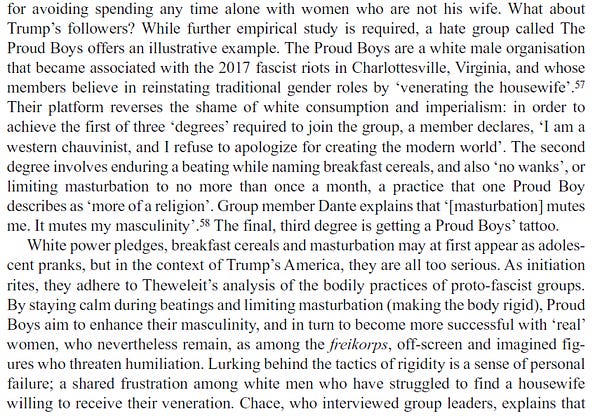https://heated.world/p/proud-boys-and-petro-masculinity
By Emily Atkin
Excerpt: Do you ever wonder what the planet might look like if men didn’t control the world?
I’m not talking about all biological men. I’m not even talking about the entirety of the male gender. Really, I’m just talking about people who believe that because they have penises, they are required to act in a traditionally, almost performatively masculine way—like “being strong” and “never showing weakness” and “not ordering sauvignon blanc.” I’m talking about the men described in this 2015 Esquire article.
I remember the first time I wondered. It was about a year ago, when a study came out about why men avoid recycling. The gist was that men perceive environmentalism as “feminine.” The researchers suggested men might reject green behaviors like recycling and carrying reusable grocery bags because they don’t want people to think they’re gay.
 Emily Atkin @emorwee
Emily Atkin @emorweestraight men avoid environmentalism because they think it’s gay, so environmental groups should consider offering more opportunities for straight men to crush puss, IS A THING THIS ARTICLE SAYS psmag.com/environment/ho…
August 5th 2019
44 Retweets167 Likes
The next time was when I read a study showing the demographic makeup of climate deniers. Turns out they’re overwhelmingly conservative white males. Researchers attributed this in part to their desire to “protect their cultural identity”—big, strong, fearless men. Researchers also attributed it to their desire to maintain the economic system that disproportionately benefits them.
“Perhaps white males see less risk in the world because they create, manage, control, and benefit from so much of it,” the study said. “Perhaps women and nonwhite men see the world as more dangerous because in many ways they are more vulnerable, because they benefit less from many of its technologies and institutions, and because they have less power and control.”
I wondered about masculinity’s role in the climate crisis again when The New Republic published an article called “The Misogyny of Climate Deniers.” It cited research showing that climate deniers are not worried about the loss of a livable planet—they are worried about the loss of “a certain kind of modern industrial society built and dominated by their form of masculinity.” The study’s author, Martin Hultman, explained:
There is a package of values and behaviors connected to a form of masculinity that I call “industrial breadwinner masculinity.” They see the world as separated between humans and nature. They believe humans are obliged to use nature and its resources to make products out of them. And they have a risk perception that nature will tolerate all types of waste. It’s a risk perception that doesn’t think of nature as vulnerable and as something that is possible to be destroyed. For them, economic growth is more important than the environment.
…
If that ideology sounds familiar, it’s because it is derived from the exact same type of masculinity that researchers have repeatedly shown to be a driving force behind climate denial. Cara Daggett, an assistant professor of political science at Virginia Tech, calls this petro-masculinity.
 Charley Weatherill @CharleyLancs
Charley Weatherill @CharleyLancsSeptember 30th 2020
3 Likes
In her 2018 paper on the subject, Daggett argues that traditional masculine identity is inherently tied to the fossil fuel economy. “The narrative of righteous fossil democracy is crucial not only to American identity writ large, but to its hegemonic white masculinities,” she writes. When the narrative of righteous fossil fuel democracy is challenged, it thus becomes interpreted as a challenge to those masculinities. “Through the rosy nostalgia afforded by petro-masculine identity,” Daggett writes, “the affront of global warming or environmental regulations appear as insurgents on par with the dangers posed by feminists and queer movements seeking to leach energy and power from the state/traditional family.”
…


